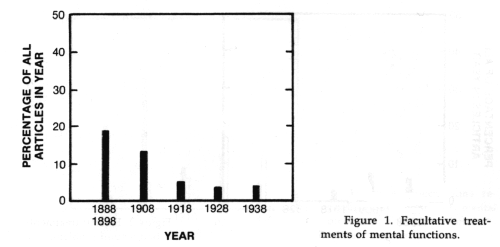
An internet resource developed by
Christopher D. Green
York University, Toronto, Ontario
(Return to Classics index)
Gordon W. Allport (1940)
Harvard University
Presidential address delivered at the Forty-seventh Annual Meeting of the
American Psychological Association, Berkeley, California, September 7, 1939.
First published in Psychological Bulletin, 37, 1-28.
[Classics Editor's Note: Footnotes are given in square brackets; numbered references are given in round brackets.]
For the first time in the forty-seven years of its history this Association has elected to assemble on the coast of the Pacific. This meeting at two great centers of learning and research is not only proof of the ocean-to-ocean sweep of our membership, of our influence and prosperity, but may be taken to symbolize as well the westward trek of culture in America; or to those who like epic perspective, it may signify the westward march of Mind from Asia, to Europe, to America. But whether we think in terms of historical symbolism or not, we can hardly deny, at a time when heavy darkness has descended over the European continent, that this Forty-seventh Annual Meeting finds the burden of scientific progress in psychology resting as never before upon the membership of this Association. Fortunate we are in assuming this burden to have the support of gifted émigrés who have come so recently to join their strength to ours.
With the responsibility for the preservation and eventual rehabilitation of world psychology falling upon our shoulders, we do well to examine our credentials. Are we American psychologists equipped for the versatile leadership demanded by our comprehensive discipline; are we prepared to develop the potentialities of all its parts? These are not rhetorical questions but questions of such immediate, practical import for our science that I propose from this unusual vantage point today to seek answers as definite and unequivocal as possible. By charting the course American psychology has taken in its recent past we can determine whether the signs we observe augur the wholesome growth of psychology under our leadership and the extension of its beneficial influences to humanity at large.
Fifty Years of Change
Since psychology is whatever competent psychological workers make of it, I am asking, first, what it is that competent psychologists in America have been making of our science in the past fifty years, and seek to answer the question by the well-known method of combing our professional journals.
Thirty colleagues rated fifty journals according to their significance for, and devotion to, the advancement of psychology as science. The fourteen journals at the top of the list were chosen for analysis. For every tenth year, beginning 1888 and ending 1938, the entire periodical literature of these fourteen journals was read and analyzed.[l] To be sure, only two journals extend as far back as the decade beginning 1888,[2] and some of them did not come into existence until 1938. Yet, if the sample is smaller for the earlier years, it is likewise more exhaustive, since virtually no periodicals were omitted from the earlier years.
The selected journals contained over sixteen hundred articles in all, each of which was read and fitted to a system of thirty-two rubrics. Since many of these rubrics, especially those pertaining to the theoretical predilections of the authors of the articles, required subjective judgment, for a generous sample of the material independent judgments were secured from two classifiers. Mr. Jerome Bruner was my collaborator, and our agreement for all our separate judgments was 91%. At a later date the results of our analysis will be published in detail (9). For my purposes this afternoon a few of the most representative results will serve.

First, we note the decline in "facultative" treatments of mental functions. Figure 1 reflects the diminution in the deus ex machina type of explanation. Owing to the fewness of cases in the earlier years, we combine 1888 and 1898, and find that 19% of all articles in these years lean for their interpretation upon instinct, the "power" of attention, synthetic apperceptive unity, and kindred concepts. In successive years the falling off is gradual but almost complete. Offsetting it in part, however, is the rise of a modern facultative treatment, different in terminology, but kindred in spirit. Here we place some of the contributions, though by no means all, that deal with factors, abilities, or the libido, as if they, too, were gods of a machine. On the whole, however, this latter tendency is not marked.
Another declining interest, so far as its explicit treatment in periodical literature is concerned, is the body-mind problem. Figure 2 shows the irregular decline. To a certain extent, however, this figure masks a significant shift in viewpoint. In the earlier literature solutions to the problem were boldly offered in monistic or dualistic terms; today the fashion is to deny the existence of the body-mind problem, the denial being generally effected with the aid of Vienna logic.
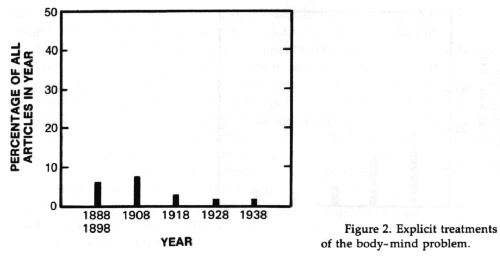
Figure 3 demonstrates the rise and fall of the unconscious. True, psychoanalytic journals are not included in our survey, but the point is here established that the principal periodicals written and read by our own Association reflect a loss of faith in the causal efficacy of the unconscious as well as of faculties in general.
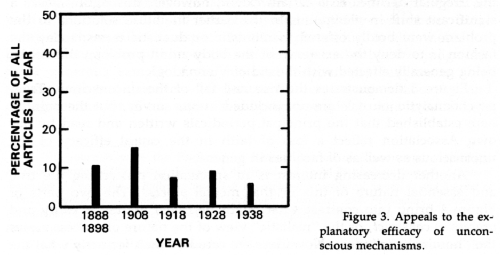
Another decreasing interest is in speculation concerning the true and essential nature of this or that mental process. The two parts of Figure 4 bring into contrast what might be called process as entity and process as construct, or the "realistic'" view of the nature of process versus the "nominalistic" view. Nowadays we care less than formerly what the nature of "intelligence," "learning" "attention," or "drive" may be, but at the same time we care more about avoiding the hypostatization of mental processes. In the white bars are entered all articles dealing with what might broadly be called methodological formalism-methods for determining constructs from operations, postulational and geometric substitutes for mental entities, criticisms of "verbal magic," and the case for "intervening variables."
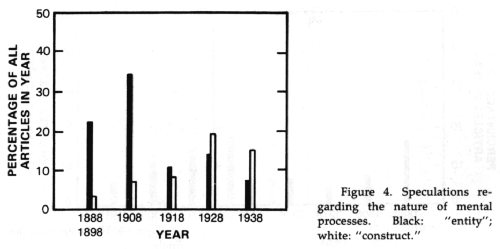
Turning from rational interpretation to experimental studies, in Figure 5 we encounter a distinct change in the manner of attacking the higher mental processes (excluding from this count perception, but including learning). In black we see a decline in studies based on language behavior, as involved in learning, reasoning, concept-formation, reverie, or creative thinking. Every study of higher mental processes requiring the verbal cooperation of the subject, excepting those based on standard intelligence tests, is here included. Note how few there are in 1938. Shaded bars represent all studies of cognitive functions and abilities based on the application of mental tests. Even these have declined in recent years. White bars include maze learning in animals and men, conditioning experiments, and all other investigations of higher mental processes by means of non-verbal methods. It is clear that the distinctively human function of language has a decreasing appeal for psychologists, even when the language expression is in the form of standardized tests. Note that the only increase is in those studies of higher mental processes conducted with animal subjects or with human subjects who for the duration of the experiment are rendered totally speechless.
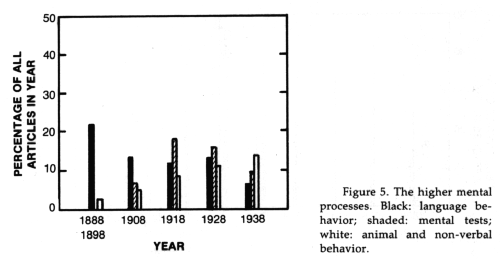
Interest in the single case has also lessened. Included in Figure 6 are articles directed toward the understanding of the individual event, based upon intensive studies of clinical cases, individual persons, or single historical events, stressing the setting of the case in its life-environment. Formerly the idiographic view of the single case was fairly popular; in recent years it has almost been ruled out of court. We seem now relatively uninterested in what the individual case can teach us, or in checking our scientific schemes against the obdurate concrete event.
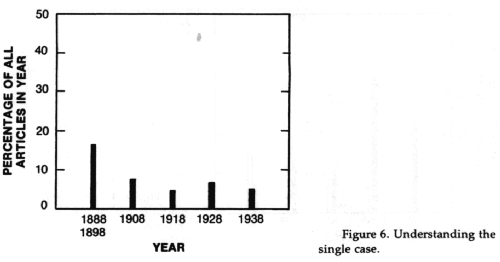
In Figure 7 we see a decline in the percentage of contributions dealing with applied psychology as well as of those concerned with social betterment. In view of the flourishing activity of the American Association for Applied Psychology and the Society for the Psychological Study of Social Issues, it is surprising to find a distinct falling off in articles applying psychology to life or pointing it in the interests of social amelioration. The conclusion to be drawn, I think, is not that our membership as a whole is less interested in the usefulness of psychology, but that a certain professional cleavage is developing. Psychologists using the fourteen journals studied are, in their writings, becoming more and more remote from living issues and more abstract in the presentation of their subject matter. The consulting, applied, and socially-minded psychologists are turning to other, more specialized, journals not included within our survey. Thus, the indication is that "pure" and "applied" psychology are parting ways to some extent -- an event which some will deplore and others welcome.
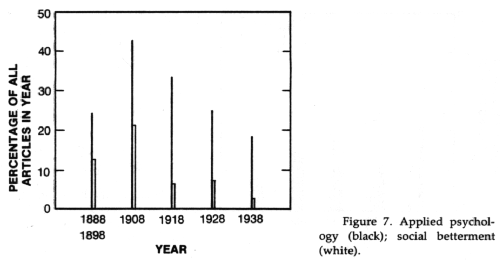
A decline of another sort is seen in the diminution of historical surveys. After steadily increasing their recognition and acknowledgment of antecedent studies, it looks now as if psychologists have started to declare their independence of the past. There are fewer historical reviews, as such, in our journals, and fewer historical preludes to experimental reports. Whether the fault lies with the authors who no longer feel respect for past work in their special lines of research, or with the editorial guillotine that decapitates articles to fit our crowded journals, I cannot say. But the fact remains that as research accumulates in our archives it is cited less frequently in our current publications.
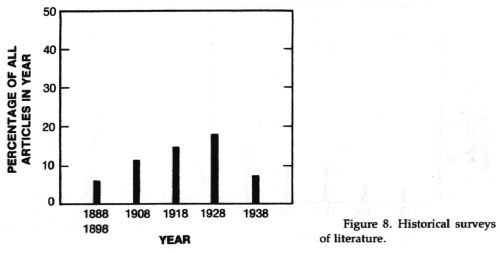
Turning from negative to positive trends, we find, first, striking evidence of the increased use of statistical aids in the treatment of research data. Formerly, statements of central tendency were sufficient. Nowadays, measures of range, variability, correlation, and still more elaborate quantitative treatment of data are increasingly employed, until nearly half of all our periodical literature shows dependence upon them.
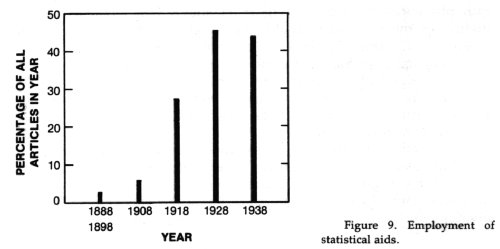
It is still too early to tell whether or not the decline in 1938 reflects a substantial growth of interest in more intensive work with fewer subjects, though there seem to be promises of this change not only among clinical psychologists but among animal psychologists as well.
Another decidedly upward trend is the use of animal subjects in psychological research. In 1888 and 1898, taken together, only 3.5% of all studies employed animals -- and this always with the intent of finding out how animals as animals behave; whereas last year over 15% of all articles were based upon investigations with animals and with no such modest expectation. Today it seems animals are not studied for their own sakes, but rather for what Fabre, the naturalist, called the "universal psychology" revealed by all animals from insects to Homo sapiens.
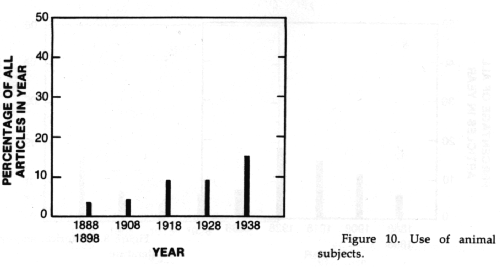
Another rise is seen in the growth of studies dealing specifically with physiological functions. Figure 11 shows the trend. The earlier studies for the most part sought physiological correlates of conscious experience. The reviving interest in physiological research, accompanied by incomparably greater proficiency in such techniques as extirpation and electrical recording, centers less often upon the parallelism of bodily functions and experience, but studies bodily functions directly in a manner that makes the line between psychophysiology and physiology increasingly difficult to draw.
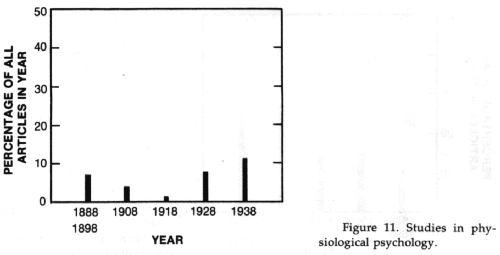
Somewhat more elusive for classification is the growing tendency to regard processes or events as differentiated within a total context. Figure 12 shows a decline and rise in this point of view. Most of the earlier entries did mere lip-service to the proposition that all factors in the total situation must be considered. Only a few of them actually demonstrated the truth of this proposition as recent researches have done. The latter show unmistakably the influence of both modern neurology and Gestalt theory. Entries include studies of physical and mental growth, the figure-ground relationship, field theory, situational determination. In a variety of ways these investigations recognize the importance of dynamic segregation, of the determination of the part by the whole.
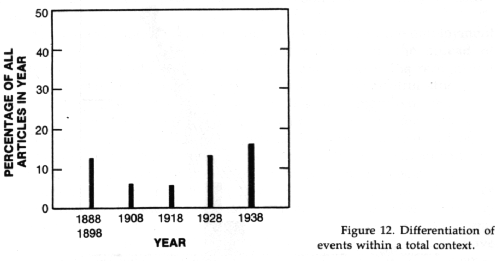
Next, though in a way the point is repetitious, I call your attention to the general upswing in methodological studies. Making no distinction as to what kind of methodology is under discussion, we see the trend in Figure 13. As a matter of fact, the earlier methodological articles dealt chiefly with the metaphysical nature of psychological data and asked how we should set about our studies of attention, intelligence, and thought, viewed as real processes. Later studies, on the other hand, are concerned primarily with getting rid of entities, giving the necessary arguments for constructs, intervening variables, rational learning curves, and the like. More specifically, the modern methodologists generally subscribe to some form of logical empiricism, increasingly to operationism.
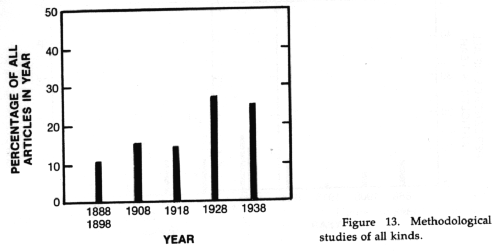
Concerning operationism itself, the term, though new, has a special lure. Figure 14 shows its upward path. In 1928, close on the heels of Bridgman's book, one article mentioning operationism appeared. To bring the trend to date, the percentage for the first six months of 1939 has been added.
A close-up shows that the course of this magic concept is onward and upward, leading somewhere into the world of tomorrow.
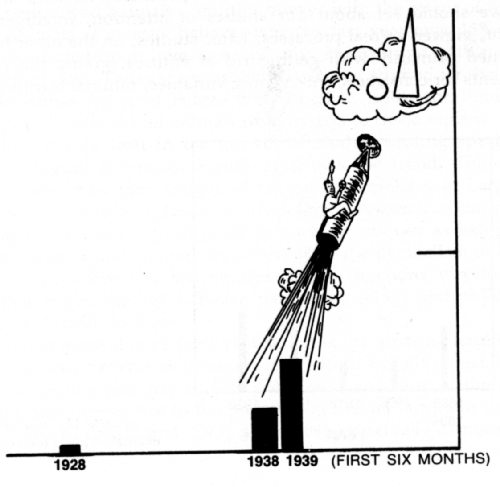
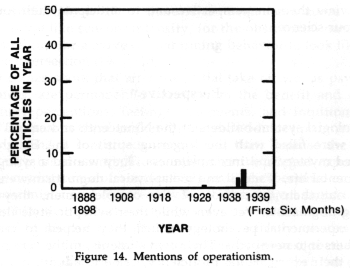
Such are some of the waxing and waning fashions of the day. The story is incomplete, but even from the few points just plotted, we can draw a significant perspective. Reviewing the evidence, we find mental faculties and hypostasized psychic processes vanishing rapidly, though here and there still masquerading behind new terms. The body-mind problem, never solved, has been declared popularly null and void. Dualism evokes rejection responses of considerable vehemence. (Indeed, of all philosophical pollens, psychologists seem most allergic to this.) The appeal of the unconscious is dwindling. Higher mental processes as exhibited in the speech of human beings are relatively neglected, marked preference being shown for studies of non-verbal behavior and for animal subjects. A schism is apparent between pure and applied psychology, and there is a growing disregard for studies of single cases. It also looks as if modern psychology were becoming appreciably unhistorical.
Among accelerated trends we find a striking rise in the employment of statistical aids, in the use of animal subjects, in the spread of physiological research. At the same time there is a growing recognition of the importance of context, which has led to many fruitful studies of dynamic segregation. Methodological studies have mounted, characterized especially by philosophical theorizing concerning the nature of psychological constructs. Operationism is the current watchword of an austere empiricism. Synoptic systems, such as those of McDougall and Stern, have given way to miniature systems, and embracing theories expounded in the grand manner have yielded to diminutive theories implemented with great precision. Immediate experience is rigidly excluded from most modern systems, and in its place surrogate operational functions are sought. Needless to say, all these trends have staunch and able advocates, but our task today is not to extol them -- rather, to view them in perspective and to anticipate their long-range effects on our science.
Perspective
The psychological system-builders of the Nineteenth and early Twentieth Centuries were filled with the lingering spirit of the Enlightenment which hated mystery and incompleteness. They wanted a synoptic view of man's mental life. If moral and metaphysical dogmatism were needed to round out their conception of the complete man, they became unblushing dogmatists. Yet even while their synoptic style flourished, the very experimental psychology which they helped to create was leading others into new paths. Their own students, in the very process of enhancing their experimental proficiency, came to admire not the work of their masters, but the self-discipline of mathematics and of the natural sciences. Willingly they exchanged what they deemed fruitless dialectics for what to them was unprejudiced empiricism. Nowadays, for one experimentalist to proclaim another "superior to controversy about fundamentals" is considered high tribute (8, p. 133).
There are with us still, of course, stubborn apostles of the Enlightenment who have not been pleased with this turn of events. They complain that we are putting too little architectonic into our work; that, though not everyone should be a myth maker, we must have a few whose weighty influence will keep the rest of us keyed to the necessity of seeing larger significance in what we do. They say we have become a craft overstuffed with techniques and that, preoccupied with minutiae, we are in danger of losing perspective. They even say that Leipzig in labor brought forth a mere mouse (36, p. 429). But the modernist says à bas! with such nostalgia, and down, too, with synoptic systems, and down with the dated subjective categories derived from immediate experience that are invoked to sustain these systems. We will have no more of them!
Fierce and portentous is the modern attack upon immediate experience.[3] While it is commonly granted that the immediate experience of the investigator is the source of the subject matter of psychology, as of all other sciences, yet it is said that like the older sciences psychology should instantly supplant this direct experience by indirect objective formulations. Subjective immediatism must give way to a public outdoor attitude toward our knowledge. It is said that the very claim made by some psychologists that their work remains true to life, close to untrammeled common sense, is the very thing that disqualifies this work from being scientific (26, p. 178). There is no need for a curve of sensory intensity to feel like sensory intensity, for the obstruction method to feel like a desire, nor for a curve of conforming behavior to look like a crowd at a traffic intersection (19, p. 33).
So it comes about that after the initial take-off we, as psychological investigators, are permanently barred from the benefit and counsel of our ordinary perceptions, feelings, judgments, and intuitions. We are allowed to appeal to them neither for our method nor for our validations. So far as method is concerned, we are told that, because the subject is able to make his discriminations only after the alleged experience has departed, any inference of a subjectively unified experience on his part is both anachronistic and unnecessary (6). If the subject protests that it is evident to him that he had a rich and vivid experience that was not fully represented in his overt discriminations, he is firmly assured that what is vividly self-evident to him is no longer of interest to the scientific psychologist. It has been decided, to quote Boring, that "in any useful meaning of the term existence," "private experience does not exist" (7).
When it comes to validating his work, the modernist follows a logic all his own. He certainly implies that his findings overspread the problem initially formulated from experience -- that thresholds of discrimination correspond to thresholds of consciousness,[4] that crossings of a grid correspond to desire, and that PGR [psycho-galvanic reflex]deflections correspond to felt emotions. But should he return to the initial experience from which he started in order to validate or to apply these findings, he would probably be startled -- even as the layman is startled by -- the grotesque lack of fit. Fortunately for him, however, his creed forbids him to consult more than his skeletonized operations-the full-bodied experience he started with is never appealed to.
The consequences of the raid on immediate experience have already been shown in the graphs: disbelief in the existence or approachability of mental processes as such, a night from linguistic functions, loss of interest in the single case, as well as in the historical background of psychology, and at the same time the development of a notable schism between the psychology constructed in a laboratory and the psychology constructed on the field of life.
An increasing number of investigators now pin their faith upon experimentation with animals. Our program tells us that 25% of the papers delivered at this year's meetings are based upon animal research. In 1914, twenty-five years ago, the corresponding percentage was 11.
A colleague, a good friend of mine, recently challenged me to name a single psychological problem not referable to rats for its solution. Considerably startled, I murmured something, I think, about the psychology of reading disability. But to my mind came flooding the historic problems of the aesthetic, humorous, religious, and cultural behavior of men. I thought how men build clavichords and cathedrals, how they write books, and how they laugh uproariously at Mickey Mouse; how they plan their lives five, ten, or twenty years ahead; how, by an elaborate metaphysic of their own contrivance, they deny the utility of their own experience, including the utility of the metaphysic that led them to this denial. I thought of poetry and puns, of propaganda and revolution, of stock markets and suicide, and of man's despairing hope for peace. I thought, too, of the elementary fact that human problem-solving, unlike that of the rat, is saturated through and through with verbal function, so that we have no way of knowing whether the delay, the volition, the symbolizing and categorizing typical of human learning are even faintly adumbrated by findings in animal learning.[5]
One should not prejudge this issue; but before we wander much farther down the road we are traveling might we not with profit hold a symposium for the purpose of discovering to what extent infrahuman analogues have given us power to predict, understand, and control human behavior? It is not, of course, a question of the parallels from anatomy and physiology obviously valuable for medical science, but of parallels in gross molar conduct applicable in a sphere where the culture and peculiar genius of humanity prevail. We need to ask ourselves point-blank whether the problems we frame with our rats are unquestionably of the same order as the problems we envisage for human kind; and further, if we succeed in solving a problem for rats, how we are to make sure the findings hold for man unless we repeat the whole investigation on man himself; and if we are forced to verify our principles by a separate study of man, whether we have the right to inveigh against the psychologist who prefers to study human manners and morals, since it is upon his work that the validation of our own will ultimately rest.
At the present time there can be little doubt that it is not altogether the demonstrated value of animal research that accounts for its vogue, but in large part its delightful suitability for the exercise of objective and approved methods. By studying rats, not men, we gain status as scientists, for like the natural sciences we can, in this line of investigation, employ precision techniques and operational modes of communication. This desire for status on our part is understandable, but because of it we are in danger of losing sight of the true source of the eminence of the elder sciences. Their enviable glory does not consist in their fidelity to a set of conventional methods, but rather in the unexampled power they have given mankind in predicting, understanding, and controlling the course of nature for mankind's own benefit. As a mature science psychology, too, will find its justification, not in performing a ritual of method, but in contributing to humanity the power to achieve these ends.
Prediction
Considering, then, man's interest in his own well-being, let us ask how matters stand with psychological prediction. Is it not true that apart from a narrow range of segmental reactions in the laboratory we psychologists can predict very little concerning human conduct? It is argued, of course, that sophistication in methodology will improve matters. Yet there are two grounds for doubting this claim. First, since the current methodological trend will not take direct experience as a model for its constructs nor return to it for a validation of its results, it seems unlikely that the utility of its predictions will be great. Or to state the point affirmatively, in order to predict events of pressing significance for human life one must deal with these events (not with some simplified surrogate or analogue), studying them at a suitable level of complexity and checking one's predictions by the actual lives men lead.
The second ground for misgiving lies in the fact that the modern methodologist, no less than his predecessors throughout the history of psychological science, fails to see the peculiar need in psychology for the prediction of the individual event. Of the two kinds of prediction appropriate to psychology -- the actuarial and the individual -- the former only, up to now, has received the attention it deserves.
Suppose we set out to discover the chances of John Brown to make good on parole, and use for the purpose an index of prediction based upon parole violations and parole successes of men with similar histories. We find that 72% of the men with John's antecedents make good, and many of us conclude that John, therefore, has a 72% chance of making good. There is an obvious error here. The fact that 72% of the men having the same antecedent record as John will make good is merely an actuarial statement. It tells us nothing about John. If we knew John sufficiently well, we might say not that he had a 72% chance of making good, but that he, as an individual, was almost certain to succeed or else to fail. Indeed, if we believe in determinism at all, his chances are either zero or else 100; he is bound to succeed or else to violate because the germs of his future are already contained in his attitudes, in the meaning to him of his antecedent life, and in the specific psychological environment that molds him. Even admitting the possibility of unforeseeable accidents, as scientific determinists we ought to strive for a prediction more accurate than the senseless 72% that is derived from a table of norms based on the antecedents of paroled men en masse. Or again, if seven in ten Americans go to the movies each week, it does not follow that I have seven in ten chances of attending. Only a knowledge of my attitudes, interests, and environmental situation will tell you my chances, and bring your prediction from a 70% actuarial statement to a 100% certain individual prediction.
The upshot of the matter is this: psychology will become more scientific, i.e. better able to make predictions, when it has learned to evaluate single trends in all their intrinsic complexity, when it has learned how to tell what will happen to this child's IQ if we change his environment in a certain way, whether this man will make a good executive, whither this social change is tending.
For certain purposes actuarial predictions have their uses. They are based on the type of law that transcends geographical-historical context. Yet in many cases we find that human conduct is so utterly modified by geographical-historical context, and by all concurrent internal trends accompanying the behavior in question, that laws ignoring context do not entirely meet our need.[6]
Our survey has shown that an increasing number of psychologists are becoming aware of the importance of context. The time is therefore ripe to seek more assiduously those laws that define the influence of ground upon figure, context upon judgment, traits upon behavior, frames of reference upon attitudes and activity, situational fields upon performance. These contextual laws are stepping stones toward that form of synthetic understanding on the basis of which truly serviceable predictions concerning individual happenings are made.
One large section of our profession will claim success in the line of approach I have indicated. Clinical psychologists will say that their daily work requires all manner of individual predictions, and that guidance is based upon it. In principle they are right, but two admonitions are in order. First, clinicians need to check their judgments rigorously, for the validity of clinical predictions is rarely known. Further, they need to make explicit the basis on which their correct predictions are made. Urgently we need to know the way in which successful predictions in individual cases are arrived at. In the meantime psychologists in general might do worse than study the bases of correct predictions made by statesmen, psychiatrists, lawyers, and even head waiters, whose skill in forecasting important aspects of human behavior is greater than ours. If we can first learn from them, we may ultimately teach them and ourselves more. To raise our level of prediction above that achieved by common sense, even by superior common sense, should be our steadfast aim.
Understanding
To the power of prediction science adds the capacity to understand what we observe. By understanding I mean the ability that human beings have to place details of information within a pattern of thought. Psychologists have long known that no fact apprehended ever stands alone, for it cannot be a fact until it is embedded within, and interpreted by, a context to which it is in some way related. With the advent of dynamic psychology it became common knowledge that what is accepted as fact depends very largely upon the individual's sense of the importance of fact, each individual carrying with him convictions concerning what is important for him.[7] Sometimes we call these convictions his values. Unless we can first comprehend our subject's value-context, we are unable to know the significance of his behavior as he performs it, for the simple reason that the behavior we perceive is instantly ordered to our own presuppositions without any regard to what his presuppositions may be. In other words, our frame, not his, supplies the context.
Let me give an illustration. Suppose a psychologist sets about to study learning. Suppose, too, he brings to his task a firm sense of the importance of mechanical connectedness. He observes the subject's behavior, and since fact depends upon the sense of the importance of fact, he interprets this observed behavior in terms of his own presuppositions concerning mechanical connectedness. Now, the learning itself was achieved by an individual who had a very different sense of values. He was not learning in order to demonstrate mechanical connectedness to himself, but in order to acquire something important to him. Shall the psychologist understand this behavior with the aid of his own imperatives or strive to understand it in the light of the subject's imperatives? In the former case mechanical connectedness becomes the chief law of learning; in the latter case interest and importance become the chief law.[8]
Instead of attempting to understand the other organism's point of view and interpreting his activity in reference to this, it is our custom early in our investigations to disregard or even to disrupt his context of behavior, and, instead of comprehending his activity within his frame of importance, to interpret his behavior in terms of our own. Moreover, when we make rational reconstructions of our findings (constructs), we do so from the point of view of our presuppositions and communicate them to other scientists sharing these same presuppositions. In the course of this procedure the pattern of trends peculiar to the organism, what the organism is trying by himself to do. is almost completely lost to sight.
You will recognize that I have here been skirting the problem of Verstehen formulated and explored by German psychology; and you will admit that it is one of the leads from German psychology that has not been followed very far by Americans. Our own psychology would profit if we undertook to apply to it our genius for clarification. There are, of course, in America a few theoretical skirmishes with the problem (2, 17), and some native experiments that point the way, among them the investigations of Murray and his collaborators (25) L. B. Murphy (24), Allport, Walker, and Lathers (1), Estes (14), Cartwright and French (12).[9] In various ways all these experiments have shed light upon the process of understanding the contexts and imperatives that determine behavior from the subject's point of view.
Let us turn back for a moment from the subject's sense of importance to the experimenter's. To some extent it is inevitable that in striving for system each of us plan his experiment in his own way, select his instruments and subjects, and draw his interpretations in accordance with his own presuppositions, excluding what is not consistent with his frame of importance. Such natural pedantry is not necessarily an evil, for specialization must be allowed within our extensive subject matter. But it follows that, unless we have a diversity of presuppositions and interests in our science, we shall lose all those forms of experience that are automatically excluded when but one set of presuppositions is followed. Especially today variety is needed, for limited and miniature systems are in fashion, from which exclusions are exceedingly strict.
Our survey has shown that this is an age of interest in methodology. What it has not so clearly shown is that the purveyor of methods is necessarily asking you to accept his own frame of presuppositions. It is for this reason that it becomes necessary to scrutinize the consequences of any commitment of method. Even so harmless a methodological doctrine as operationism is fraught with unexpected entanglements.
In an age of turmoil, one hundred and seventy years ago, Voltaire made the demand: "If you would converse with me, you must first define your terms." In our present age of turmoil, operationism is making the same refreshing demand (31). It is a demand that appeals to all sensible men. Now, the best way to define a term is by the use of the typical instance or event. When we speak operationally we say, in effect, "I mean something which is illustrated by the following actions." In this way, through the telling illustration, we communicate a prior understanding in ourselves in order to arouse a like understanding in others. Operationism thus may become a useful tool of understanding.
But when the operationist goes further and insists that "a concept is synonymous with the corresponding set of operations," can he mean what he says? If so, there must be an infinitude of discrete concepts. Think, for instance, of all the different operations that have gone into the study of learning. To prevent complete and senseless pluralism operations have to be grouped by classes, and there is ultimately no way of grouping them except by relational thought. The most austere operationist communicates not operations, but a prior concept, for operational symbolizing depends upon prior ideas of entities and relations that are symbolized. Even if we try to rely upon the "standard experiment," as Tolman proposes, to serve as the operation by which a concept is defined (32), it is only by virtue of some act of understanding that the equivalence of this experiment with others can be established.[10]
It is not to operationism's demand for illustrative definitions that objection can be made, but to the fact that its hidden metaphysical presuppositions of extreme nominalism beckon us away from the fundamental problem of how we know things together. Hyperaesthesia for our operations and anaesthesia for understanding make us lose our way in an infinitude of detail. Synoptic views become more and more difficult; an entropy of scientific energy sets in. Fearful lest we imply that we did something more than our experiments indicate, we are tempted to give up our search for useful generalizations and to disclaim responsibility for the wider application of our work.
Along this path lies skepticism which -- as historians have noted -- sends forth its pallid bloom at the end of eras of great intellectual advance. Permit me to quote two passages from a recent methodological book written by an able experimentalist:
Science after all is only one of the games played by the children of this world, and it may very well be that those who prefer other games are in their generation wiser. It must be remembered, however, that science is a game and those who play it have a right to insist that it be played according to rule. If some of the players, or the bystanders, try to change the rules, the game will go to pieces, or at least, it will not be the same game. (26, p. 57)
And again:
Science is a vast and impressive tautology. Its laws are summaries of observations, its hypotheses involve arguments that are circular. Since its explanations are true only if they can be demonstrated empirically, they explain nothing that is not already known. The mystery which surrounds the life of man is as dark today as it was when man first came out of the jungle, and will be just as impenetrable when the last surviving scientist thinks his concluding thought or writes his final Sentence. (26, p. 154)
Such weariness is inevitable so long as we make the test of psychology one of fidelity to method rather than to understanding, prediction, and control. Methodism as the sole requirement of science means that all the faithful crowd onto a carpet of prayer, and with their logical shears cut more and more inches off the rug, permitting fewer and fewer aspirants to enjoy status. Two debilitating attitudes result: that of the playboy who likes his childish games, and that of the fatalist who sees no duty devolving upon a scientist other than that of formal ritual. The survival value of either attitude is zero, for both lead us, and all those who look to psychology for help, to believe that psychology has no essential relation to life, and that human events lie entirely beyond our control. Such a belief undermines the very civilization that has endowed psychology with its freedom, in return charging it with the contribution of useful knowledge.[11]
Control
Until our deficiencies in prediction and understanding are repaired, it is unlikely that psychology can go far in meeting the third and supreme criterion of validity for science -- that of practical control of human affairs. The clinician is most active in this direction. He and other consultants, educators, and technicians are controlling human events, but whether more successfully than unaided common sense could do depends on evidence still to be supplied in conscientious records of success and failure.
Outside of the clinical field little control is attempted. The man of common sense approaching our treatises for help finds that a large portion of his daily conduct is not only left unexplained, but is not represented at all. From agencies of government, industry, education, and human welfare come daily appeals for assistance in their service to mankind. Psychology, as science -- may I repeat? -- can be justified only by giving mankind practical control over its destinies, not by squatting happily on a carpet of prayer.[12]
Frame of Reference
Fortunately, currents engender countercurrents. The flow in psychology today is not altogether toward the shoals and reefs of formalism and of skepticism. Our evidence (Figure 12) shows a strong revival of interest in the problems of context, which of necessity include the structure of the human personality and its activity within its social surroundings. To study highly integrated functions at levels where serviceable prediction and understanding result is, of course, a most difficult undertaking, requiring inventions of method not dreamed of today; requiring, also, the borrowing of many tools of precision and safeguards of measurement from the experimentalist's storehouse. It is characteristic of this new movement that its concepts have a realistic and humanistic flavor, for it is vital in this new work to believe that something real and substantial is under investigation.
An example of the trend is the growing interest in the frame of reference, a concept which I have appropriated for the title of this address. It is of recent origin and may for that reason be viewed with suspicion. Yet it is, I feel sure, the legitimate offspring of the flourishing principle of dynamic differentiation. It expresses the importance of context; it repairs the ravages that result from viewing the behavior of other organisms exclusively within the investigator's frame of presuppositions; it aids in understanding. Its fruitfulness is seen in many experimental studies of the past five years, including those of Ansbacher (4), Cantril (10), Darley (12), Kornhauser (18), McGregor (22), Sells (28), Sherif (29), Stagner (30), Watson and Hartmann (34), and others.
Frame of reference has to do with any context whatever that exerts a demonstrable influence upon the individual's perceptions, judgments, feelings, or actions. Often the influence is -- to use Köhler's term -- "silent." Of the existence of frames the subject himself is only partially aware, and unless he is well warned the investigator too may overlook them entirely. At the present time it is especially the social and dynamic psychologists who are ardent on the trail, although much pertinent related work is found wherever there is research upon problems of equivalence, aspiration level, life space, constancy phenomena, and psychophysical judgment.
Many frames, of course, especially those encountered in psychophysics, are neutral and impersonal in type, providing simple spatial and temporal orientations. Others are personal and ego-involving.[13] The position of college buildings upon a campus is an impersonal spatial system that orients and directs our excursions to and from our classes; but our status within the collegiate hierarchy is of a more personal order, charged with intimate importance to ourselves, and determining affective attitudes of motivational significance. Dynamic and social psychologists are especially concerned with these personal, ego-involving frames, and are often able to show that what are sometimes thought to be neutral-perceptual judgments, even the judgments of scientists themselves, are not wholly determined by an objectively established frame, but are entangled deep in the web of personality.
The relation of frames to attitudes and to traits is a problem yet to be worked out. These concepts all refer in various gradations to complex and relatively persistent forms of mental organization. Their popularity, together with that of trend, need, sentiment, and other kindred concepts, gives support to McDougall's claim, expressed in one of his last papers, that the most indispensable doctrine in modern psychology is that of tendency (21). All are frankly class concepts, and can be defended, I think, for the superior promise they hold in our triple task of predicting, understanding, and controlling behavior.
Class concepts though they are, they do not necessarily exclude considerations of cultural influence nor the situational field. It is especially those frames of reference adopted as the "wise prejudices" of our own station, class, and culture that reflect prevailing social norms. We are now making progress in the detailed study of conforming behavior, in the composition of ideological thought, and in the genesis and development of frames in childhood.[14] We are beginning to sort out that monstrously tangled heap our Councils have christened "personality and culture." Not yet, however, are we able to tell what makes a mauve decade mauve, or a skeptical age skeptical, or psychology in the 1880's soulful and in the 1930's soulless. Nor do we know the extent to which a man can shake himself free of the influence of his times, or even recreate them to his liking. Freud, we know, had something to do with Queen Victoria's downfall; but was he consequence or cause? Who can say?
Speaking on this very campus forty years ago, John Dewey, later to become the eighth president of our Association, made what for that time was a striking observation (13). Psychology, he held, cannot help but be politically conditioned. He had in mind, for example, the fact that doctrines of the fixedness of human nature flourish in an aristocracy and perish in a democracy. The privileges of the elite in ancient Greece, and the doctrines of the Church in mediaeval times, provided the setting for psychological theories of their day. Under modern conditions theories of statehood play a major role.[15]
The president of the Deutsche Gesellschaft, addressing that organization last year, praised typological studies that enabled psychology, in matters of heredity, race, and education, to pick out the national Gegentypus whose unwelcome qualities are individualism and intellectualism. In passing, he warned against using the mental tests that one of the great figures in psychology, William Stern, a Jew, had introduced, and said that he wondered not at all that some of his colleagues had been censured for pursuing a pre-revolutionary course of thought. At the same time he added:
Antagonistic foreign countries speak of coordination (Gleichschaltung) whenever conformity of science and politics is perceived. No, this conformity is certainly not based on coordination, but upon the fact that politics and science, now for the first time, strive after truth even in the basic questions of existence, over which heretofore darkness and error reigned. (15, p. 14)
And what is the situation with us? Do we American psychologists lack politically determined attitudes? At first thought it would seem so, for are we not entirely free in our individual researches, and may we not hold any fantastic view that we choose? We may, and that proves the point for the political determinist, for only in a democracy can anything like a "socially detached intelligentsia" be realized. On the theory that democracy will ultimately gain by giving each thinker all the space he wants, we American psychologists are subsidized, encouraged, and defended. Each worker may elect, as he pleases, any section or subsection of psychology that he finds suited to his taste and abilities.
The desirability of keeping alive diversified investigation and a diversified sense of importance is the generous lesson that democracy teaches us. Now, if ever, must we learn it well and apply it to ourselves. If we rejoice, for example, that present-day psychology is -- as Bills has pointed out (5) and as our survey has shown-increasingly empirical, mechanistic, quantitative, nomothetic, analytic, and operational, we should also beware of demanding slavish subservience to these presuppositions. Why not allow psychology as a science -- for science is a broad and beneficent term-to be also rational, teleological, qualitative, idiographic, synoptic, and even non-operational? I mention these antitheses of virtue with deliberation, for the simple reason that great insights of psychology in the past -- for example, those of Aristotle, Locke, Fechner, James, Freud -- have stemmed from one or more of these unfashionable presuppositions
My plea, therefore, is that we avoid authoritarianism, that we keep psychology from becoming a cult from which original and daring inquiry is ruled out by the application of one-sided tests of method; that we come to evaluate our science rather by its success in enhancing -- above the levels achieved by common sense -- our powers of predicting, understanding, and controlling human action. As an aid to progress I have tried especially to strengthen the case for research upon complex patterns of human mental organization, frames of reference, the subject's point of view, and the act of understanding.
If we but watch with amused humility our own personal frames affect our perceptions and our deeds, we will then enjoy and profit from our disagreements. Best of all; we shall be able to sink these disagreements into a common determination that the vast horizons of our science shall not prematurely close down, neither through bigotry, nor surrender to authoritarianism, nor through our failure to pay our way in the civilization that is sustaining us.
Bibliography
1. Allport, F. H., Walker, L., & Lathers, E. Written composition and characteristics of personality. Arch. Psychol., N.Y. 1934, 26, No. 173.
2. Allport, G. W. Personality: A psychological interpretation. New York: Holt, 1937.
3. Allport, G. W. The individual and social psychology of John Dewey. In P. A. Schlipp (Ed.). The philosophy of John Dewey. Evanston: Northwestern Univ., Press. 1939. Ch. 9.
4. Ansbacher, H. Perception of number as affected by the monetary value of objects. Arch. Psychol., N.Y. 1937, 30, No. 215. .~.-
5. Bills, A. G. Changing views of psychology as a science. Psychol. Rev., 1938, 45. 377-394.
6. Boring, E. G. Temporal perception and operationism. Amer. J. Psychol.. 1936. 48, 519-522.
7. Boring, E. G. A psychological function is the relation of successive differentiations of events in the organism. Psychol. Rev., 1937, 44, 445-461.
8. Boring, E. G. Review of R. S. Woodworth's Experimental psychology. Amer. J. Psychol., 1939, 52, 131-138
9. Bruner, J. S. & Allport, G. W. Fifty years of change in American psychology (Forthcoming in the Psychol. Bull.)
10. Cantril, H. The prediction of social events. J. Abnorm. Soc. Psychol., 1938, 33, 364-389.
11. Cartwright, D., & French, J. R. P. The reliability of life-history studies. Character & Pers., 1939, 8.
12. Darley, J. G. Changes in measured attitudes and adjustments. J. Soc. Psychol., 1938, 9, 189-199.
13. Dewey, J. Psychology as philosophic method. Berkeley: Univ. Chronicle, 1899; reprinted as Consciousness and experience, in his Influence of Darwin on philosophy and other essays. New York: Holt, 1910. Pp. 242-270.
14. Estes, S. G. Judging personality from expressive behavior. J. Abnorm. Soc. Psychol., 1938, 33, 217-236.
15. Jaensch, E. Wozu Psychologie? Ber. XVlth Kongr. dtsch. Ges. Psychol., Leipzig, 1939, 7-30.
16. Kelley, T. L. Mental factors of no importance. J. Educ. Psychol.. 1938, 30, 139-142.
17. Klein, D. B. Scientific understanding in psychology. Psychol. Rev., 1932, 39, 552-569.
18. Kornhauser, A. W. Attitudes of economic groups. Publ. Opin. Quart., 1938, 2, 260-268.
19. Lashley, K. S. The behavioristic interpretation of consciousness. Psychol. Rev., 1923, 30, 237-272.
20. Lashley, K. S. Experimental analysis of instinctive behavior. Psychol. Rev., 1938, 45, 445-471.
21. McDougall, W. Tendencies as indispensable postulates of all psychology. Proc. Xlth int. Congr. Psychol., Paris, 1937, 157-170.
22. McGregor, D. The major determinants of the prediction of social events. J. Abnorm. Soc. Psychol., 1938, 33, 179-204.
23. Miller, J. G. Discrimination without awareness. Amer. J. Psychol., 1939, 52, 562-578.
24. Murphy, L. B. Social behavior and child personality: an exploratory study of some roots of sympathy. New York: Columbia Univ. Press, 1937.
25. Murray, H. A., et al. Explorations in personality. New York: Oxford Univ. Press, 1938.
26. Pratt C. C. The logic of modern psychology. New York: Macmillan, 1939.
27. Ryan, T. A. Dynamic, physiognomic, and other neglected properties of perceived objects: a new approach to comprehending. Amer. J. Psychol., 1938, 51, 629-650.
28. Sells, S. B. The atmosphere effect: An experimental study of reasoning. Arch. Psychol., N. Y., 1936, 29, No. 200.
29. Sherif, M. The psychology of social norms. New York: Harper, 1936.
30. Stagner, R. Measuring relationships among group opinions. Publ. Opin. Quart., 1938, 2, 622-627.
31. Stevens, S. S. Psychology and the science of science. Psychol. Bull., 1939, 36, 221-263.
32. Tolman, E. C. Operational behaviorism and current trends in psychology. Anniv. Celeb. Inaug. Grad. Stud., Univ. So. Calif., Los Angeles, 1936, 89-103.
33. Tolman, E. C. Psychology versus immediate experience. Phil. Sci., 1938, 2, 356-380.
34. Watson, W. S., & Hartmann, C. W. Rigidity of a basic attitudinal frame. J. Abnom. Soc. Psychol., 1939, 34, 314-336.
35. Whitehead, A. N. Modes of thought. New York: Macmillan, 1938.
36. Zangwill, O. L. Review of R. S. Woodworth's Experimental psychology. Brit. J. Psychol., 1939, 29, 429-431.
Footnotes
[1] The journals were the Psychological Review; Journal of Experimental Psychology; American Journal of Psychology; Journal of Abnormal and Social Psychology; Journal of General Psychology; Psychological Bulletin; Journal of Psychology; Pedagogical Seminary and Journal of Genetic Psychology; Journal of Social Psychology; Character and Personality; Journal of Educational Psychology; Psychometrika; Journal of Comparative Psychology; Journal of Applied Psychology.
[2] The Psychological Review, founded 1888, and the Pedagogical Seminary, founded 1891.
[3] A full explanation of this attack would have to include an account of many influences, among them (a) long frustration with the body-mind problem, (b) cumulative attacks upon the reliability of introspection, (c) imitative strivings after the "monism" of the natural sciences, (d) slight success in empirical studies of thinking, reasoning, volition, (e) correspondingly greater (felt) success with animal experimentation.
[4] A point concerning which J. G. Miller's experiment has raised considerable doubt (23)
[5] In a valuable paper on the experimental analysis of instinctive behavior K. S. Lashley tells of the activity of the microstoma, a tiny marine worm, that, having no stinging cells of its own, captures and ingests hydras that have, until it is sated and has incorporated in itself the nettles it needs for its own protection. Regarding this remarkable performance Lashley has written: "Here, in the length of half a millimeter, are encompassed all of the major problems of dynamic psychology. There is a specific drive or appetite, satisfied only by a very indirect series of activities, with the satisfaction of the appetite dependent upon the concentration of nettles in the skin" (20, p. 446). One wonders whether the only major problems of dynamic psychology are those having to do with specific drive and its satisfaction through an indirect series of activities performed by an uncorticated organism. Does a cortex bring no major problems of its own? Are symbols, dreams, autism, irreality, guilt feelings, the ego ideal, of no essential significance? Does culture create no major problems for dynamic psychology? And has the microstoma, one wonders, that curious type of scientific motivation that requires it to view itself as a mechanism devoid of immediate experience and volition?
[6] It does no good to object that everything in the universe supplies a context for everything else, that "if a man is ever to utter the whole truth about a natural event, he must not shut his mouth until he has expressed all nature" (7, p. 445). It is still a question of what degree of limitation upon the System chosen for study is most serviceable. Because some limitation is obviously required it does not follow that the most fruitful level to adopt is that of the most isolated possible motor automatism (the elementary discrimination).
[7] Especially instructive is A. N. Whitehead's discussion of the relation between matter-of-fact and the sense of importance of fact (35, Ch. 1).
[8] To be sure, the organism has a way of insistently making its point of view apparent, trying, as it were, to tell the psychologist that the primary law of learning lies in this sense of importance. So the psychologist then postulates demands or drives to account for learning, but continues to view these within his (the psychologist's) own frame of importance. Our current conceptions of motivation are not framed from the subject's point of view. If they were, we should study less often mechanical retroaction, and more often the classificatory power that interest confers on memory; less often the effects of specific incentives or drives, and more often the mature interest systems in accordance with which human beings acquire their knowledge and skill.
[9] The importance of this last-named experiment, soon to be published, lies in its demonstration that in judgments of personality the validity attained by each of two judges can be in excess of their reliability. That is, two investigators may have demonstrable correctness that exceeds their agreement with one another, because each understands different aspects of the subject's personality. It follows that when we pare down our acceptable data until only that portion remains upon which all investigators agree, we are left with less than our just scientific reward. What is needed is a method of combining demonstrably valid insights rather than a reduction of our data to the bare bones upon which all observers may objectively agree.
[10] Critics have pointed out that the agreements under the operational creed do not go deep, and that the unity of science is after all not just around the comer. Some advocates of operationism maintain that it readily includes both immediate experience and the introspective technique within its view, some think the opposite; some would admit purposive interpretations within operationism, others would exclude them; some think that field theory fits, some that it does not. And if, as some say, its sole objective is to separate the rational criteria of inquiry from the positive and experimental criteria, then there is but temporary gain, since we have to return to understanding in order to know-together the rational and empirical ingredients of the analysis.
[11] Not infrequently the skeptic derides applied psychology. Outside the laboratory he lives a cultured and varied life of a free agent and useful citizen. Yet his methodical work in the laboratory overspreads very little of his daily experience and prevents integration in his life. Though he generally repudiates a dualism of mind and body, he welcomes the equally stultifying dualism of laboratory and life.
[12] It seems only fair to add that there are signs of a growing demand among psychologists for significant and useful research. The demand is clearly apparent among social psychologists, and elsewhere as well. T. L. Kelley, speaking recently to mathematical psychologists, has urged them to invent and employ "measures of utility" in order that the factors they conjure into being may turn out not to be factors of just no importance at all (16).
[13] In making the distinction between personal and impersonal frames, T. A. Ryan (27) confines the former to certain self-referred Systems of space, time, or meaning, neglecting to consider the emotional frames that are ego-involving.
[14] Especially fascinating are the problems in this area. Consider, for example, the question which frames the child adopts from his playmates and which from his parents. Matters of politics and religion he ordinarily seems to refer to frames taken from parents, but standards of speech and clothing to frames acquired from his contemporaries. Why do he do so?
[15] In this connection the striking fusion of John Dewey's own psychological theories with his allegiance to democracy is well worth special study (cf. 3, Ch. 9).